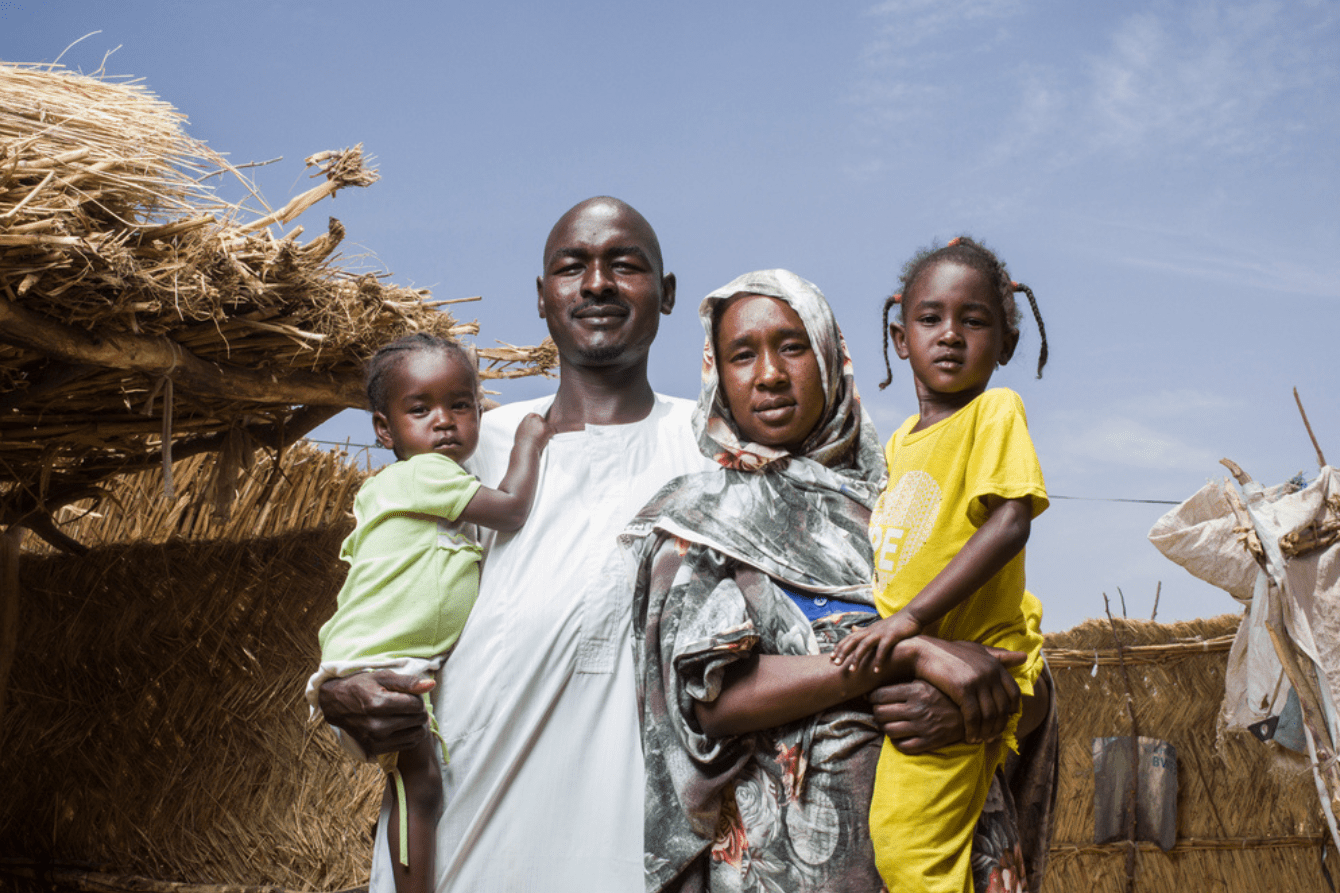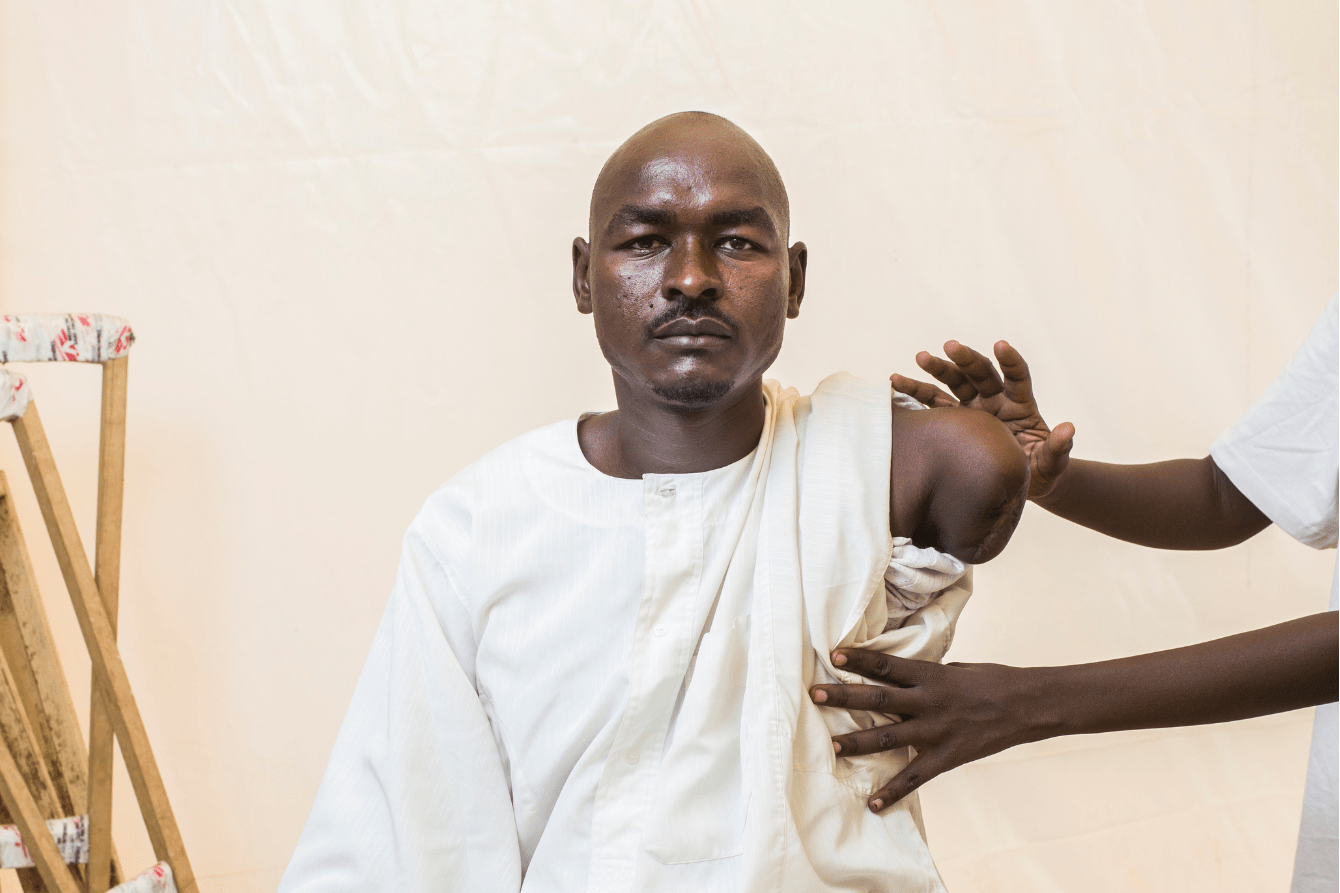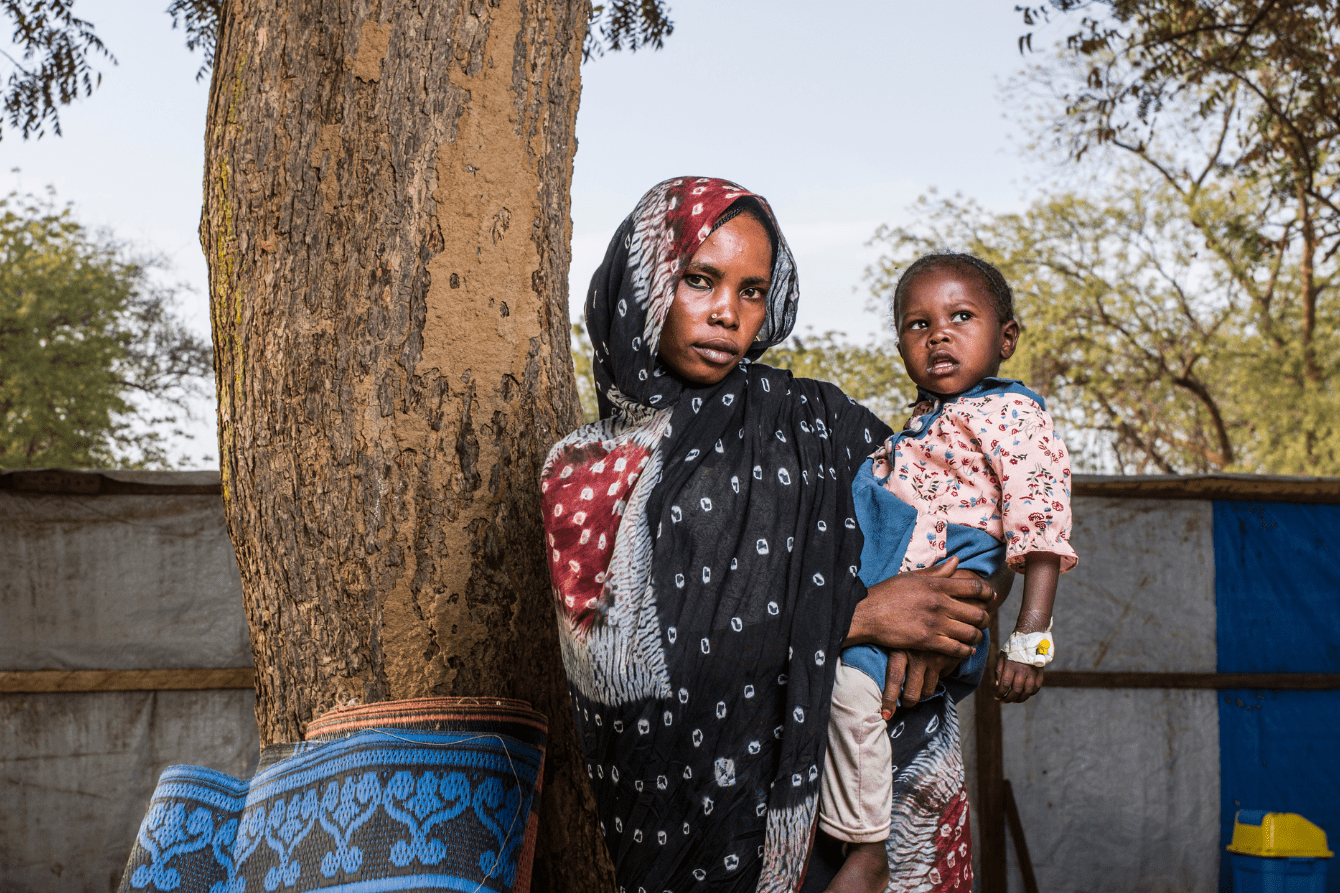Nearly 20 years after the exodus and ethnic cleansing that took place during the war in Darfur, Sudan, Masalit communities in El Geneina, West Darfur are again facing targeted violence.
Hundreds of thousands have fled to neighboring Chad over the past year, where Doctors Without Borders/Médecins Sans Frontières (MSF) teams have documented horrific accounts of violence, including sexual violence and massacres, as well as lootings, beatings, and the burning of homes.
Recently, photographer Corentin Fohlen joined MSF teams in Chad to provide a glimpse into the lives of survivors. As the refugees confront the harsh realities of day-to-day life in camps where access to basic needs is severely lacking, they express their hope of returning to the city they left behind alongside a grim sense of déjà vu in the shadow of Darfur.

Recovery in Chad
Djouwahir Abderamane emerged from a long hospital stay in April after being shot in the head, haunted by the scenes of horror she endured as a university student in El Geneina. The 23-year-old is still partially paralyzed and often experiences seizures.
“The militia attacked our whole family,” said her mother, who described shootings in the street, torched homes, and physical abuse at the height of the ethnic violence last June. The violence forced hundreds of thousands of people, mainly from the Masalit ethnic group, to risk everything and flee to Chad despite the dangerous journey.
Like her friends and relatives, Djouwahir is concerned for the future. Can people recover from trauma like this? What future awaits refugees in Chad, where they can’t work or move freely?


Djouwahir Abderamane, a Sudanese refugee, and Fatime Djeffal, mental health counsellor in Adre, Chad. Chad 2024 © Corentin Fohlen/Divergence
Since June 2023, MSF and Ministry of Health teams have performed surgery on over 2,000 war-wounded patients in Adré. Upon discharge from the hospital, some were first sent to Ambelia, a temporary camp where MSF opened a clinic to help them recover. The clinic offers post-surgery medical care, which includes providing rehabilitation by physiotherapists, checking that fractures are healing properly, changing dressings, and managing pain.
Patients also have access to mental health services. "I work with patients traumatized by the war in Sudan," said mental health counselor Fatimé Djefall. "The doctors refer us to patients suffering from trauma admitted to the hospital. The mental health counselors also identify victims of violence who require mental health support. Cases we can’t handle are referred to a psychologist or psychiatrist."

Not one, but two exiles
In late May, refugees sheltering in Ambelia camp and the wounded were transferred to Farchana, a more permanent camp and one of the first set up in east Chad in January 2004. It has since been extended to accommodate more refugees.
Adam Mohamat Khamis knows Farchana only too well, as it’s where he spent part of his childhood. His parents ended up in the camp after fleeing their village when it was torched and razed to the ground by Janjaweed militias in 2003. The oldest in his family, he returned to El Geneina to study and then married.
Adam was living in the city with his wife and two daughters when the escalating violence forced him to flee yet again. A week passed between the time he was shot in the arm in El Geneina and his arrival at Adré hospital in June, and by then his wound had become infected.

"I lost my arm because I couldn’t get treatment in time," Adam explained, "We were careful to stay out of sight as we walked and kept hoping to reach the Chadian border. It was horrendous. My arm had to be amputated and I spent three months in the hospital." Like many others, Adam depends on food distributions.
Adam is in charge of teaching history and geography in improvised lessons held in the camp. His eldest daughter often asks him when they’ll be able to return home, but what she misses most is school.
"This time, returning to Sudan is out of the question," said Adam. His wife wants them to be relocated to a secure country like the United States. Her brother died in the Mediterranean Sea while attempting to cross from Tunisia.

A large number of patients are arriving in Adré with wounds already infected for several days.
“At the time, I was the only orthopedic surgeon,” said Mahamat Zibert Hissein, who was working with MSF in November 2023 when people wounded in the Ardamatta massacre began arriving. “There were lots of gunshot bone fractures and most were infected. I remember one particular case, a young kid who was about 15. He arrived with a tourniquet his parents had applied a week before. His sisters were with him, but not his parents."
"Given the state of the wound, amputation was the only option," Dr. Hissein explained. "In the operating room he said to me, ‘Doctor, you know that even with one leg, it’ll be me who’ll have to take care of my little sisters. There’s no one else.’”

A massive humanitarian crisis
In Chad, one in every five children will not reach their fifth birthday. Out of a population of about 17.4 million, over 2 million people are living with severe food insecurity.
“In recent months we have taken as many as 10 refugee families into our home,” said Umsamaha Yacoub, a Chadian woman whose son is an inpatient in Adré hospital’s intensive therapeutic feeding unit for malnutrition treatment. “We share our food with them while they wait to be relocated to camps where they can access food distributions.”
Chadian and Sudanese children are treated in MSF’s pediatric and nutrition units, which are currently operating at full capacity with up to 130 beds.

The arrival of large numbers of vulnerable Sudanese refugees in this unstable region has exacerbated pressure on local resources and livelihoods, and the Chadian government declared a state of food and nutrition emergency at the beginning of 2024.
While refugee camps set up nearly 20 years ago are chronically overcrowded and the new ones that are springing up have insufficient capacity, the more than 100,000 refugees in transit in Adré have to do what they can to survive in makeshift shelters or under plastic sheeting. There is not enough water and malnutrition is taking its toll on the most vulnerable. In an effort to improve living conditions, over a year ago MSF began rolling out large-scale emergency operations to deliver medical treatment and supply water.

Mutual support and casual jobs are not enough. When so many people depend on humanitarian aid, World Food Program distributions—which, due to lack of funding, are routinely under threat of being suspended—are absolutely vital. More and more refugees crossing the border into Chad every day say they are fleeing hunger and destitution, a situation that is only getting worse as the conflict in Sudan drags on.
“When I arrived in Adré, I couldn’t find work and the food distributions weren’t enough to feed us,” said Fatime Deffa Ibrahim. “I used to live in Ardamatta in Sudan, and when the war broke out, I came to Adré with my 10- and 12-year-old daughters. The RSF [Rapid Support Forces, a party to the conflict in Sudan] looted everything we had. I spend my days making these bricks. For 1,000 bricks I’m paid 300 CFA francs [30 cents].”

Care for survivors of sexual violence
Sexual violence has been a defining feature of the war in Sudan and is spilling over into Chad. MSF provides victims with medical care and mental health support, but due to a lack of information and fear of stigma, many survivors go untreated.
Activists, social workers, medical personnel, and lawyers already involved with these issues back in Sudan continue working to raise awareness, documenting abuses and supporting victims in Chad.
"We see many rape victims with suicidal thoughts," said an activist from the ROOTS association, which managed a social center in Sudan and raised awareness about sexual and gender-based violence. "Isolated, they tell us they’d be better off dead because they’re uprooted from their country, feel rejected, and don’t dare report the violence they’ve been subjected to."

The ROOTS association also provided victims with advice about medical treatment, informed them of their rights, and guided them through the legal system. Lawyers who continue their work from exile in Chad are forced to remain anonymous.
“During the war, our volunteers have kept up their work and continue to relay information from the city’s various neighborhoods,” one activist said. “The militias came to my house,” one activist said. “I was a target and it was me they were looking for. When they didn't find me, they killed my father. We were on the wanted list because we were documenting violence against civilians and combatting impunity for war crimes committed in Darfur. The militias had lists with our names and photos. Numerous colleagues have been raped or killed in this war."
The threats do not stop upon reaching Chad. Some feel insecure because they sometimes recognize perpetrators walking among people in markets or in camps around Adré. Calls and messages from Sudan threatening to track them down and kill them are common.
"They’re not going to stop us or put us off,” said one of the activists. “We have every intention of seeing this through."
Iqbal
“In Aboutengue camp, we don’t even have a place to sleep. The shelters are all taken. I have no work and walking is difficult. My eldest daughter has offered to come to Adré to try and earn some money to help us buy food for our family ...

Ashei
“I’m 65 and I arrived here yesterday. We lived in a village, Abura, but in 2003 we had to move to Ardamatta. In November, Ardamatta was attacked, so we went back to our old village. But there’s nothing left to eat there. My brothers were killed in the war, the harvests have been wiped out and in the past few months it’s been really difficult to find food. I was advised to come to Adré to get treatment and, given that we’ve lost everything, register as refugees.”

Saffa
“My daughter Faiha has been in the malnutrition treatment program for five weeks. Getting hold of food is really hard here. I have a ration card, but I didn’t get anything at the last distribution. I make bricks to earn some money while my sister watches the baby. But for a week now there’s been no work. My parents are sick and my sisters are still very little, so it’s only me who can work. Faiha’s father went missing in El Geneina...

Gomasha
“I arrived here today from Ardamatta with my mother and daughter. We haven’t been here before. Life has been tough. We kept telling each other to be patient, but we couldn’t stay any longer. The Arab militia took our donkey and we’ve lost everything—our animals and our crops. There’s nothing left to eat, so we came here. Also, as the pain in my arm keeps me awake. I’ve come to see a doctor.”





